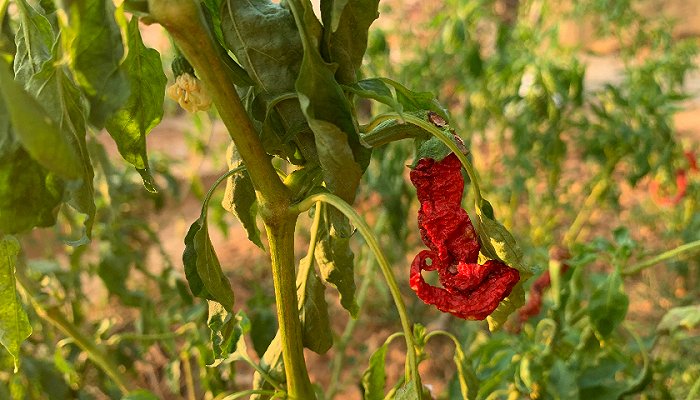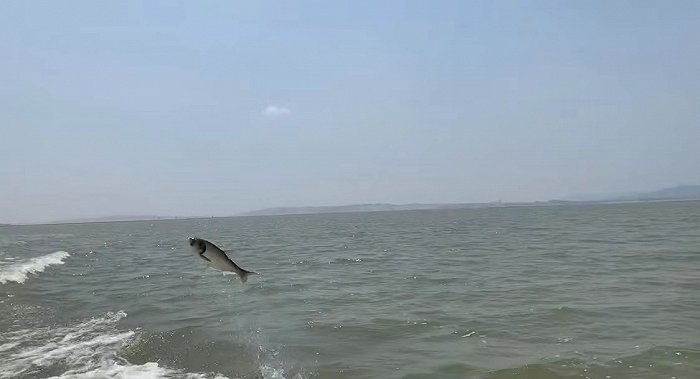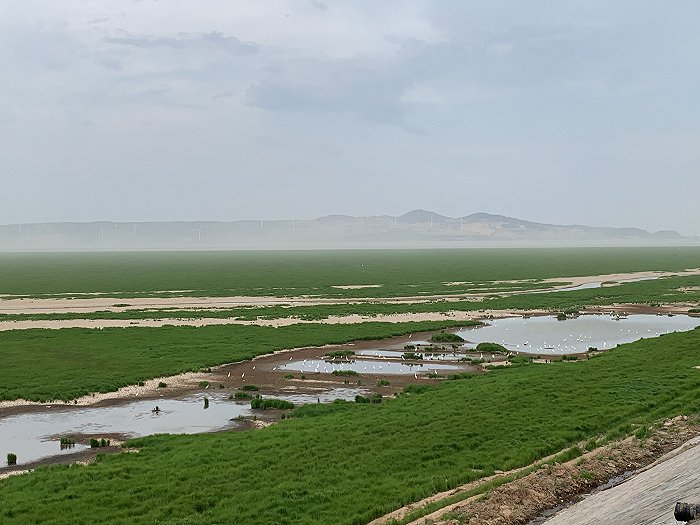As Poyang enters the dry season too soon, it leads to the dry and hard ground that is unable to provide food, and the birds will have to move on or die.

An aerial view of a dried up Poyang Lake. Photo from CFP
By CHENG Dafa
In previous years, from June to August, Poyang Lake – the largest freshwater lake in China – in the eastern province of Jiangxi covered more than 3,300 square kilometers. This year, the lake has shrunk by 2,200 square kilometers in seven weeks since late June and continues to retreat daily.
On September 6, the emergency management bureau of Jiangxi said the water level of Poyang is still getting lower and may hit a record low in the next few weeks.
Jiangxi province issued a yellow warning for heavy rain on Aug 24, 2022. Around 5 pm, people in Datang Village heard the thunder. Some waited in their yards and others gathered in the village square. They have been waiting for the rain for more than 20 days. ZHANG Shanhui was so excited that he put off his work and gathered with his neighbors outside his home.
"We all joked that we should hurry up and get ready to catch the rain with pots and pans," he said.
But the rain didn't come. The sun broke through the clouds and the villagers waiting for the rain in the square dispersed in disappointment. Zhang sighed anxiously, "It will be sunny again tomorrow".

Jiujiang to the north of Poyang Lake, is one of the areas hardest hit by the drought. At the end of August, daily highs in Jiujiang dropped from above 40 degrees Celsius to around 38 degrees. The skin burns after walking under the sun for two minutes. The wind from the lake is heavy with the rancid smell of dead fish.
‘This is not normal'
Retired fisherman ZHANG Jianbao usually works on his barge at Datang, He used to spend the whole summer on the bank at the end of the village. This year the water is nearly 2 kilometers away and Zhang is suffering from heatstroke.
"In my 70 years of life, I have never seen Poyang Lake so dry. Never," he said.
ZHANG Qifan has nearly 4.5 hectares of soybeans. The income covers his family’s expenses as well as the wages of workers hired in the spring. But most of his soybeans had dried up and died in the fields by the August harvest. "The beans are all shriveled up and I can't sell them for any price", he said.
On the west bank of the lake, fishermen are worried. "This is not normal. The water level did not rise much in June and it started to recede in July. In previous years, the water receded in September", said ZHANG Xiuli.

Zhang Xiuli has been "completely unable to leave the house" this year and has to turn on the air conditioning at home every day. She plants some vegetables near her home, mainly peppers and eggplants, but they all died this year. She waters the vegetables every evening, but she can't keep up.
In Datang village, there is almost no lush vegetable patch. Zhang said that the price of vegetables in the market has risen in the past two months.
Zhang Jianbao owns a barge on Poyang, as the large freighters on the lake can’t pull into the shore, workers rely on Zhang’s boat to commute between home and freighters.
But this year, the freighters are out of jobs for the shrunken lake bringing little fishery harvesting. A freighter with a maximum cargo capacity of 3,000 tons could barely make a profit when it is fully loaded, not to mention this year, it is only able to load about 800 tons of cargo. Many freighters moored on the lake and stopped operation.
The barge owners lose customers too. Workers in the little boats suffer sunstroke almost every day. The barging company installed air conditioning on the boats for the safety of the crews, but that put another 10,000 yuan debt on this small company that was only founded two years ago and is still losing money.
Since late July, dead fish have been floating on the surface of the lake. The smell is almost unbearable, so workers gather the fish and bury them.

DAI Nianhua of Jiangxi Academy of Sciences explained that Poyang Lake has undergone many changes. The most obvious of these is a marked change in the hydrological rhythms that underlie ecosystems. Poyang is a seasonal lake, with abundant water from April to early September. Water recedes from mid-to-late September until January when the lake enters the dry season. These periodic changes drive all life around the lake.
Five rivers from upstream pour into the lake and from the lake, it flows into the Yangtze River. This year, Dai noticed that the discharge of water of the lake is 2.7 times quicker than the influxion in August, changing the rhythm of the lake.
As the lake has shrunk, there is less room for fish and other aquatic life. The water contains less oxygen at higher temperatures, fish are more active, and they need more food. When the fish are driven closer together, the chances of dying due to lack of oxygen and food are higher.
An important wintering ground for rare waterfowl such as cranes and storks, " the water level drops during the dry season and it is easy for migratory birds to feed", Dai said.

When the water level drops, birds can find fish and shrimp in the water. Vegetation sprouts and grew again, and the young buds of the plants provided food for herbivorous geese, while the underground tubers of aquatic plants provided food for cranes, swans and swan geese.
"The gradual lowering of water level in Poyang Lake during the dry season is not a bad thing, but provides a variety of feeding habitats, Dai said.
But this is not supposed to be the dry season now. As Poyang enters the dry season too soon, it leads to the dry and hard ground that is unable to provide food, and the birds will have to move on or die.